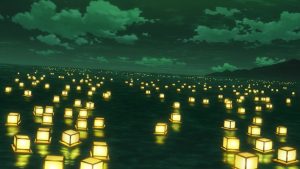 My feelings about the reboot of Youkai Ningen Bem are decidedly mixed so far, but I will say this for it – it makes one appreciate just how good this version of Gegege no Kitarou really is. Comparatively speaking BEM feels so bland and tired, lacking any seeming imperative to exist and uninspired in its design. Gegege no Kitarou 2018 has embraced the modern age with stunning cleverness, not just using technology as props but writing stories which weave classic Mizuki Shigeru themes into present-day situations.
My feelings about the reboot of Youkai Ningen Bem are decidedly mixed so far, but I will say this for it – it makes one appreciate just how good this version of Gegege no Kitarou really is. Comparatively speaking BEM feels so bland and tired, lacking any seeming imperative to exist and uninspired in its design. Gegege no Kitarou 2018 has embraced the modern age with stunning cleverness, not just using technology as props but writing stories which weave classic Mizuki Shigeru themes into present-day situations.
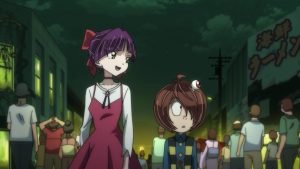 Among its many successful additions to the franchise I rank Mana near the top. It’s hard to overstate just how good a character she is – despite representing the most overused trope character class in modern anime Mana feels fresh and distinctive. She’s among the most realistically written adolescents in anime, I think, and I adore her (she pushes the “if I had a daughter I’d want her to be just like” button). Of course I feel a special affection for Mana this week because she referenced the governing philosophy I try and live by – “It’s better to do what you can and regret it than regret not doing anything”.
Among its many successful additions to the franchise I rank Mana near the top. It’s hard to overstate just how good a character she is – despite representing the most overused trope character class in modern anime Mana feels fresh and distinctive. She’s among the most realistically written adolescents in anime, I think, and I adore her (she pushes the “if I had a daughter I’d want her to be just like” button). Of course I feel a special affection for Mana this week because she referenced the governing philosophy I try and live by – “It’s better to do what you can and regret it than regret not doing anything”.
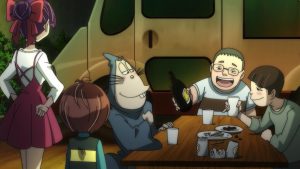 That sentiment will be put to the test in this second Sakuraiminato episode, which revolves around a Kakurezato (hidden village) which appears only once every 200 years near the beach. Someone is luring children to cross the bridge in the sky to the Kakurezato (I wonder if it’s only kids sensitive to youkai that hear the voice) as it has many times in the past, and this time around it’s Mana who hears the call. When she misses her scheduled meet-up with Kitarou and Neko-musume they realize something is up. Complicating matters is the presence of a Shinigami (Shiratori Tetsu) who plans to harvest the souls of the children who’ve been lured to the hidden village, which are highly valuable due to their ageless life on the other side.
That sentiment will be put to the test in this second Sakuraiminato episode, which revolves around a Kakurezato (hidden village) which appears only once every 200 years near the beach. Someone is luring children to cross the bridge in the sky to the Kakurezato (I wonder if it’s only kids sensitive to youkai that hear the voice) as it has many times in the past, and this time around it’s Mana who hears the call. When she misses her scheduled meet-up with Kitarou and Neko-musume they realize something is up. Complicating matters is the presence of a Shinigami (Shiratori Tetsu) who plans to harvest the souls of the children who’ve been lured to the hidden village, which are highly valuable due to their ageless life on the other side.
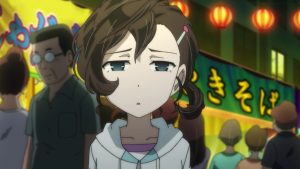 We’ve seen several episodes of GGGnK which tackle this general theme of frozen childhood, but on balance this winds up being one of the darker ones. I find it interesting that only four children seem to be in the company of the Kakurezato’s guardian (Ikemizu Michihiru, in his fourth GGGnK incarnation), and all of them from the previous Edo Period cycle – what happened to all the others? They include young samurai Arao Ichinosin (Suganuma Hisayoshi), two little boys who follow him (Kawaguchi Sakura, Reimi) and commoner girl Chiyo (Yoshida Hitomi). She’s in love with Ichinosin, which is the occasion for Mana sharing the aforementioned life advice – though even for Edo Period Japanese it’s a bit of a stretch to imagine after 200 years she’s still too timid to approach him because of their different social status.
We’ve seen several episodes of GGGnK which tackle this general theme of frozen childhood, but on balance this winds up being one of the darker ones. I find it interesting that only four children seem to be in the company of the Kakurezato’s guardian (Ikemizu Michihiru, in his fourth GGGnK incarnation), and all of them from the previous Edo Period cycle – what happened to all the others? They include young samurai Arao Ichinosin (Suganuma Hisayoshi), two little boys who follow him (Kawaguchi Sakura, Reimi) and commoner girl Chiyo (Yoshida Hitomi). She’s in love with Ichinosin, which is the occasion for Mana sharing the aforementioned life advice – though even for Edo Period Japanese it’s a bit of a stretch to imagine after 200 years she’s still too timid to approach him because of their different social status.
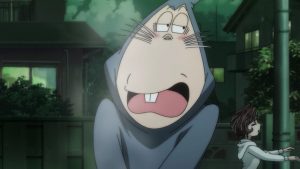 What happens with the Shinigami – a betrayal/attempted redemption by Nezumi-otoko, a battle with Kitarou, finger guns – is pretty routine Gegege no Kitarou fodder. But it’s what happens after the Shinigami is defeated with defines this episode. The children decide – in part because Mana has urged them to – that they’ll leave the Kakurezato (to the horror of the guardian) even though their own time (and families) are long gone. The look that passes between Ichinosin and Kitarou indicates that they both know (as did I) what’s likely to happen – and indeed, the young samurai has told the others what he expects to befall them. But it still hits hard when those two centuries catch up to the children all at once.
What happens with the Shinigami – a betrayal/attempted redemption by Nezumi-otoko, a battle with Kitarou, finger guns – is pretty routine Gegege no Kitarou fodder. But it’s what happens after the Shinigami is defeated with defines this episode. The children decide – in part because Mana has urged them to – that they’ll leave the Kakurezato (to the horror of the guardian) even though their own time (and families) are long gone. The look that passes between Ichinosin and Kitarou indicates that they both know (as did I) what’s likely to happen – and indeed, the young samurai has told the others what he expects to befall them. But it still hits hard when those two centuries catch up to the children all at once.
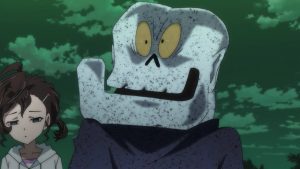 Kitarou not saying anything – not trying to dissuade Ichinosin and the others despite knowing (or suspecting) the truth – says a lot about him. Mana, it must be said, had no idea – and she’s devastated and wracked with guilt after the fact. But what the children have done is exactly what she told Chiyo to do, and in the process they’ve embraced their fate – deciding that their suspended-in-amber life in the Kakurezato was no real life at all. Was it the right decision? Who can say – that’s up to the individual to decide. But for the first time in two hundred years they’ve acted on their own free will, and one can only hope their wish is granted when they arrive at their next destination – if anyone ever deserved that, these children do.
Kitarou not saying anything – not trying to dissuade Ichinosin and the others despite knowing (or suspecting) the truth – says a lot about him. Mana, it must be said, had no idea – and she’s devastated and wracked with guilt after the fact. But what the children have done is exactly what she told Chiyo to do, and in the process they’ve embraced their fate – deciding that their suspended-in-amber life in the Kakurezato was no real life at all. Was it the right decision? Who can say – that’s up to the individual to decide. But for the first time in two hundred years they’ve acted on their own free will, and one can only hope their wish is granted when they arrive at their next destination – if anyone ever deserved that, these children do.


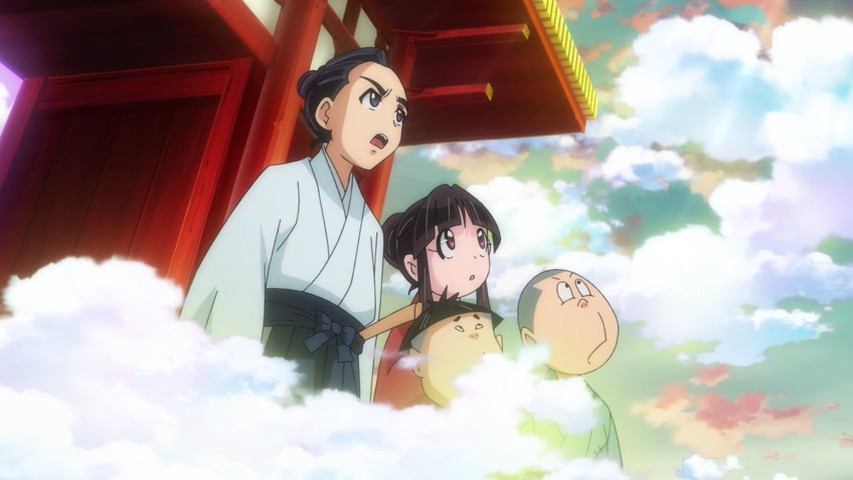

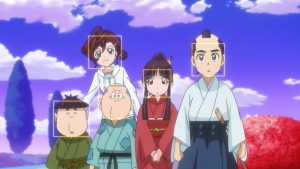
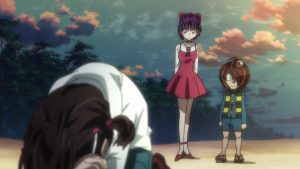
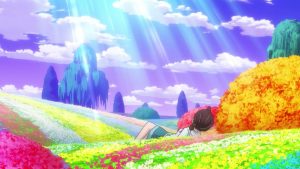
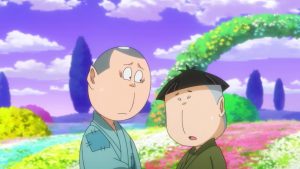


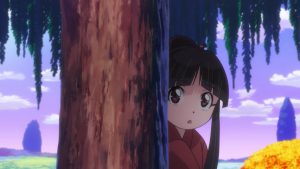

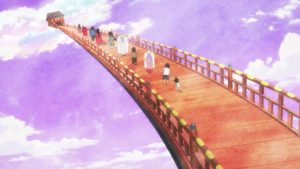


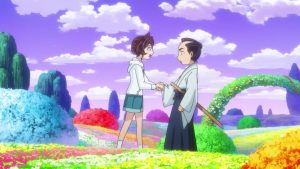
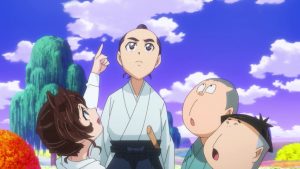


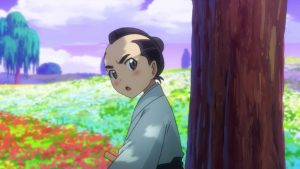
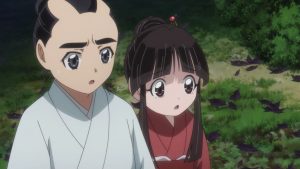
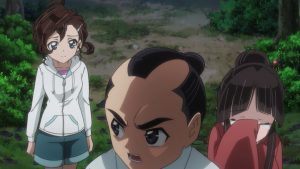

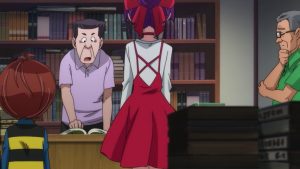

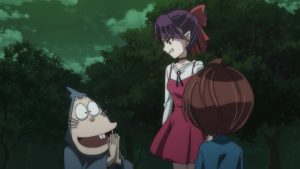
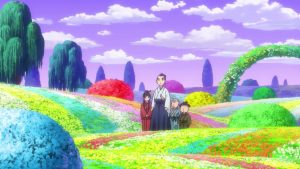
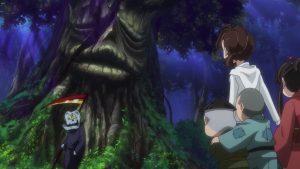
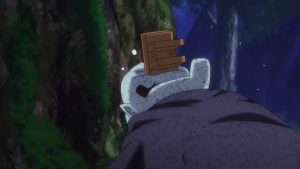
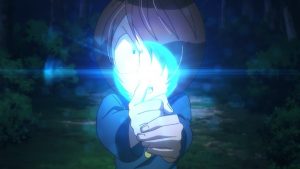
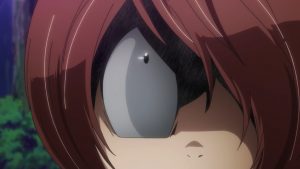
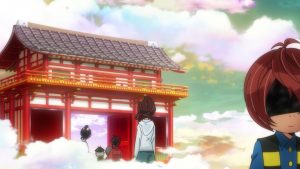

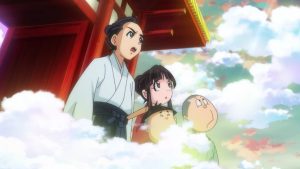
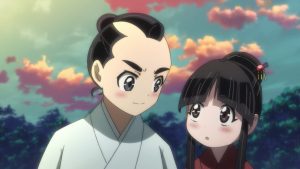
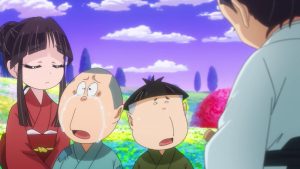
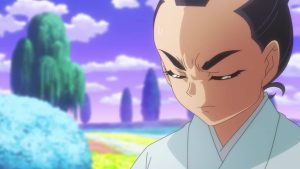
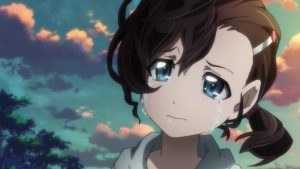
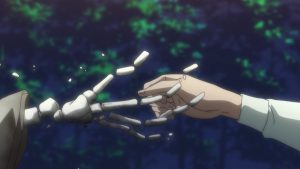





Robert Black
July 29, 2019 at 3:45 amThe kids from previous times the bridge had appeared were all scooped up by the shinigami. That’s why only the Edo kids were there.
I’d picked up the fact that both Kitaro and the kids knew what would happen when they left, but I hadn’t made the connection to Mana’s philosophy about doing what you can. Nice catch.
Aera
July 29, 2019 at 1:20 pmAfter we got a silly and fun episode that is episode 65, we got a really heartwrenching episode that is episode 66. It doesn’t help that after the scene of Mana looking up to the souls of the Edo children and bid a farewell, the cheerful ending song played right after. Talk about mood whiplash.
I had expected that something’s off, that the children wouldn’t be able to so easily depart from Hidden Village without any consequences. I just didn’t expect that it’d turn out like this. 200 years in there, literally frozen from time, surely something would happen. And just like every other series that has the characters messing with the time: the consequences are mostly not pretty. I thought the children would instantly age into old man/woman, the moment they stepped out from Hidden Village, in Momotaro-style. I didn’t expect them to be dead right after that. Then again, 200 years probably were beyond human’s capability.
Mana said it, that she would rather do something and regret it than do nothing, and she did exactly that. She did what she could, and she regretted. But she set the children free. The children didn’t think they would reunite with their parents in the next world, but I believe they would. After all, Hidden Village is just like a prison, and I think Mana did the right thing to set them free from eternal solitude.
Kitaro being eerily quiet when he met the children and rushed Mana to go back to the world really made me anxious, and the fact that the children noticed his silence really didn’t help.
A really great episode. And thank you for the review as always. Next episode is going to be about social media culture, which a lot of people probably can relate. I’m looking forward to the next Sunday morning.